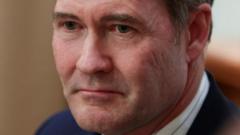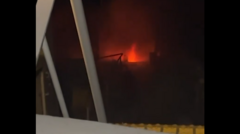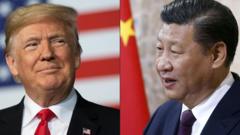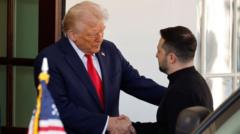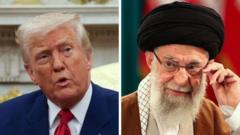During a recent interview, US Vice-President JD Vance expressed that the war in Ukraine is unlikely to resolve soon, emphasizing the importance of Russia and Ukraine reaching a peace agreement. His comments coincided with a new US-Kyiv mineral-sharing deal aimed at future security assistance, amid ongoing hostilities and calls for temporary ceasefires.
Ongoing Challenges in Ukraine Conflict Highlighted by US Officials
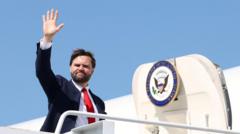
Ongoing Challenges in Ukraine Conflict Highlighted by US Officials
US Vice-President JD Vance remarks on the protracted war in Ukraine and the need for a diplomatic resolution.
US Vice-President JD Vance has conveyed a stark assessment of the ongoing war in Ukraine, stating it is "not going to end any time soon." In an interview with Fox News, Vance articulated the pressing need for the US administration to assist in facilitating discussions to help both Russia and Ukraine "find middle ground" to bring a halt to the conflict, which has persisted for more than three years.
Vance underscored that any resolution would ultimately depend on the willingness of Russia and Ukraine to negotiate an agreement. In response to criticisms of the situation, he acknowledged the anger of Ukrainians over the invasion but questioned whether continued military losses were justifiable for relatively small territorial gains. His comments were made in the wake of Washington finalizing a deal with Kyiv that permits the US to share in the profits from Ukraine's rare earth minerals in exchange for further security assistance.
The remarks come amid comments from former President Trump, who suggested that Ukraine might consider ceding Crimea, a region that has been under Russian control since 2014, as part of a peace agreement. However, Ukrainian President Volodymyr Zelensky has indicated he cannot accept Russian sovereignty over Crimea, citing constitutional constraints.
In a related broadcast, US Secretary of State Marco Rubio emphasized the urgency for a "breakthrough" in the hostilities, warning that the lack of resolution would necessitate Trump to reassess the dedication of US resources towards the conflict. The situation continues to be tumultuous, as Russian President Vladimir Putin announced a temporary three-day ceasefire starting May 8 to mark World War Two anniversary events, yet Ukrainian Foreign Minister Andrii Sybiha urged for an immediate 30-day ceasefire instead.
Despite these diplomatic overtures, fighting continues unabated, exemplified by a recent Russian drone strike in Zaporizhzhia that resulted in injuries but no fatalities. Concurrently, Moscow accused Ukraine of conducting drone attacks on a targeted market in Russian-occupied southern Ukraine, leading to casualties—a claim Kyiv denied, stating its operations focused only on military assets.





